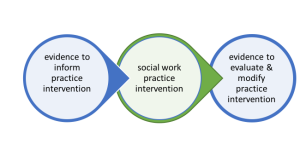Understanding the Evidence-Based Practice In Social Work

Evidence-based practice (EBP) is a process in which the practitioner blends well-researched interventions with clinical expertise and ethics, as well as client preferences and culture to guide and influence the administration of treatments and services, according to The Social Work Policy Institute.
In order to determine what is effective, for whom, and under what circumstances, the practitioner, researcher, and client must collaborate, stresses the National Association of Social Workers (NASW) Code of Ethics.
Every member of a client’s team is aware of the interventions that have already been used in an ideal evidence-based social work environment. Additionally, the client or patient can take their record with them if they are transferred to another facility, which will enable their newly expanded team to offer more individualized care.
The success of treatment depends on improved communication between various institutions and providers, but this is not the only reason social workers record their results. Social scientists can benefit the whole field by presenting their experiences as study findings, thus giving a much-deserved boost to evidence-based practice in social work.
Evidence-based practice (EBP) is not a trendy term, nor is it a “cookie cutter” method of doing social work. Finding the most effective and efficient course of action for your client or community demands critical thinking and information evaluation.
The three-pronged approach of evidence-based practice takes into account the practitioner’s unique expertise, the client’s beliefs and expectations, and the best available evidence. To direct and inform the administration of treatments and services, the practitioner in this instance integrates well-researched interventions with clinical experience, ethics, client preferences, and culture.
What Makes Evidence-Based Practice So Important?
The introduction of evidence-based practice in medicine presented medical professionals with three challenges: selecting the highest quality care for their patients, evaluating the reliability of the currently available evidence, and providing their patients with high-quality information to help them make an informed choice.
These three factors are equally significant when choosing a social work intervention and are no longer limited to the medical profession. In actuality, as the graphic shows, evidence-based practice is a three-part process.
Evidence-based practitioners adopt a lifelong learning process that involves continuously posing specific questions of direct practical importance to clients, searching efficiently and objectively for the best available evidence in relation to each question, and taking appropriate action informed by evidence. They prioritize the benefits of the client over all other considerations.
Social work is grounded in research and offers significant benefits to practitioners. This practice approach forces social workers to routinely challenge their presumptions and look for fresh data. Because evidence-based practice leaves little place for antiquated thinking, it also keeps them open to innovation.
Social workers are also given the tools they need to find pertinent, possibly previously undiscovered techniques that best meet the requirements of their clients through the use of evidence-based social work.
But lacking an evidence-based organizational culture inside human service organizations is one of the biggest obstacles to integrating research evidence into organizational life.
Also Read: Facts about Social Workers
What are Evidence-Based Practice Models?
We will only briefly touch on a few key ideas and models, as well as resources where you can learn more about evidence-based practice approaches, despite the fact that more could be written about them.
- Stages of Change: The Stages of Change model assesses a person’s readiness for change by moving them through a series of stages. It permits evidence to be regularly considered and taken into account throughout the process like other evidence-based practice approaches. There is a built-in feedback loop that takes the patients’ demands and advancement into account.
- Parents as Teachers: One of the performance models used in conjunction with social solutions software is the PAT model, which stands for Parents as Teachers. It is made to accommodate the requirements of people who get financial support from the federal Maternal, Infant, and Early Childhood Home Visiting (MIECHV) programs.
- Perform Well: It’s a website that assists in educating nonprofit professionals about performance management. On the website, you may find details on numerous models of evidence-based practice that organizations might use.
While not a model in itself, organizations wishing to apply evidence-based practice models have access to a wide range of resources. These resources can assist organizations in discovering the tools available to them to help them measure outcomes and use evidence.

This effort could be referred to as addressing “avoidable ignorance” (Gambrill and Gibbs, 2017, p. 73). Selecting an intervention strategy should be guided by evidence of “its potential to achieve the desired goals for clients” (Briar, 1974, p. 2). source: https://ohiostate.pressbooks.pub/swk3402/chapter/module-1-chapter-2-what-is-evidence-based-practice/
What are the Steps of Evidence-Based Social Work?
Social workers, like lawyers and doctors, have access to a growing body of research data that they can use to improve their therapies. However, access to research databases alone does not guarantee effectiveness; a crucial step must be taken beforehand.
What then are the procedures for doing evidence-based social work? The steps are broken out simply here.
- Determine the Issue
Although it might seem like “common sense,” skilled social workers know how crucial it is to look deeper in order to pinpoint the underlying causes of problematic behaviour.
If a client is being treated for alcohol misuse, for instance, using an evidence-based procedure won’t always be effective if the abuse is a symptom of anxiety, low self-esteem, or another condition that needs to be addressed directly. - Examine the Data
A social worker must locate the pertinent evidence after determining the root of the problematic behaviour. Although it may appear simple at first, using research databases involves far more steps than using standard search engines.
Research is a field within itself, and social workers must comprehend how to organize their queries, locate and examine summaries, and compare the efficacy of related studies. - Review the Context
This is likely the most crucial phase in the field of evidence-based social work because it determines how successful the intervention will be. The idea is straightforward: make adjustments based on how your client’s circumstance compares to those of the research participants in the study you’re using.
Results for your outpatient client may be impacted if research participants, for instance, responded favourably to one intervention but received it numerous times daily in an inpatient setting. - Apply the Intervention
It’s time to implement the intervention when the social worker has carefully examined and analyzed the available data and modified the evidence-based approach to match the unique circumstances of the client.
Social workers should think of themselves as researchers who are extending the initial finding while utilizing evidence-based practice (EBP). The more thoroughly they describe their findings, the more knowledge they may contribute to the body of knowledge. - Assess the Result
The final step entails assessing the effectiveness of the intervention when all formulation and research result in a human services intervention.
In order to effectively use the practice, practitioners must pay great attention to each phase and the cyclical structure of the process. This necessitates thorough investigation and execution.
What are the Pros and Cons of Evidence-Based Practice?
After going over the benefits of using evidence-based social work, it is crucial to remember that EBP is not always the optimal course of action. Only under the right conditions do the advantages outweigh the drawbacks.
We’ve compiled a list of the benefits and drawbacks of evidence-based practice in social work to help clarify such situations.
Pros
- EBP equips social workers with fresh tools and methods.
- The utilization of evidence-based social work is documented, which advances efficient treatment approaches.
- In many instances, using EBP models increases the likelihood of winning funds.
- Research can assist social workers in selecting among a variety of approaches.
- Due to the abundance of supporting information, evidence-based practice models are frequently simpler to adopt.
Cons
- Studies on the same topic may have conflicting results.
- Research results may be in error.
- There is a chance that the study does not include your scenario.
- The interventions used in the study might not comply with the ethical standards that apply to your area/practice.
- You might not have access to the tools or techniques from the discovery(s).
The Final Word
Globally, the social sector is only now starting to comprehend the potential of evidence-based practice models and how they may benefit organizations and individuals.
Research-based approaches in social work have many positive effects. To succeed with this strategy, social workers must, however, get over obstacles.
Practitioners in evidence-based social work need access to a wealth of research as well as advanced research skills, knowledge of how to evaluate research, and training in how to use that research in order to do so effectively.
The ability to gather and analyze data will also continue to significantly advance with the widespread use of software, enabling even better results for clients and constituents through the application of evidence-based case management and other evidence-based approaches.
